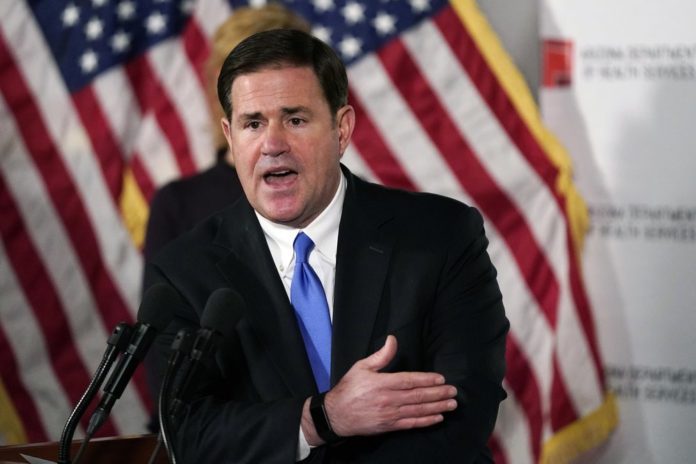Gov. Doug Ducey on Wednesday signed into law a $12.8 billion budget for Arizona that includes a significant tax cut primarily benefiting the wealthy, fulfilling a long-held priority for the Republican governor who promised to drive taxes as low as possible.
The $1.9 billion in annual tax cuts alarmed Democrats, who said the state is temporarily flush with cash but will struggle to adequately fund schools, health care, and other priorities in the future.
The governor signed budget bills after Republicans in the House and Senate resolved a stalemate over whether to expand Arizona’s school voucher program to cover more children.
The budget phases in a flat tax of 2.5% for nearly everyone, eliminating the state’s progressive taxation system that ranged from 2.59% for the first roughly $54,000 of income to 4.5% for income above about $327,000.
“Each and every Arizona taxpayer, no matter their income, will experience a tax cut under our historic tax reform,” Ducey said in a statement.
Democrats said most taxpayers will see very little from the tax cut, while the wealthiest will reap a massive windfall.
The average Arizona resident earning between $75,000 and $100,000 will save $231 a year in state income taxes, while the average taxpayer earning between $500,000 and $1 million a year will save more than $12,000, according to the Legislature’s budget analysts.
High-income taxpayers affected by Proposition 208, an initiative approved by voters last year to impose a 3.5% tax surcharge on the wealthy to boost salaries for teachers and other school employees, will continue to pay 4.5%. That essentially eliminates the impact of the Proposition 208 tax increase, which would have raised the top tax rate to 8%.
But another bill sent this week to Ducey, which he’s expected to sign, would further shield some of those taxpayers from Proposition 208 by excluding income from estates, trusts, and business profits from the surcharge. Proposition 208 applied to income above $250,000 for individuals and $500,000 for couples.
GOP lawmakers wrapped up an unusually long and contentious budget negotiation Wednesday after three House Republicans opposed to adding up to 600,000 low-income students to the school voucher program agreed to support more limited changes. Now, the program won’t be expanded, but the roughly 250,000 children now eligible will face shorter waiting periods.
Arizona’s school vouchers, known formally as empowerment scholarship accounts, allow eligible students to use the money that would otherwise go to their public school for private-school tuition, home-school materials, and other needs.
In addition to the tax cuts, Ducey and Republican lawmakers stuffed the budget with a laundry list of conservative priorities new and old, along with efforts to limit the power of elected Democrats.
Among them, the budget:
— Bans any instruction that implies that one race is inherently racist, should be discriminated against or feel guilty because of their race. It is another in a series of measures targeting or reacting to so-called ”critical race theory,” which is not currently being taught in K-12 schools. Teachers could lose their licenses and their schools fined for violations.
— Strips Democratic Secretary of State Katie Hobbs of the power to defend election-related lawsuits against the state, and bars Hobbs from hiring private attorneys. Republican Attorney General Mark Brnovich will instead get the power to stake out the state’s position in election matters. The power transfer expires after Hobbs and Brnovich leave office in 2023.
— Creates a $12 million election integrity fund to pay for election security updates and future hand recounts. It also lays out a series of security features for ballot paper, such as watermarks or holograms, though it stops short of explicitly requiring they be used. The provisions are a response to the unfounded theory that former President Donald Trump lost in Arizona and other battleground states because of voter fraud.
— Gives the state police broad power to keep videos from body-worn cameras and dashboard cameras secret. Such videos are generally considered public records now, but the budget gives the Department of Public Safety the power to decide when it’s in the public’s interest to release them. It also requires people seeking copies of videos to know the time and place it was recorded and the names of people involved.
— Requires that police misconduct be investigated only by certified officers from the same jurisdiction, essentially banning civilian-controlled review boards for police misconduct.
— Blocks public health measures including vaccine or mask mandates meant to control the coronavirus in schools and universities. Mandatory testing will also be outlawed, except in cases of outbreaks in dormitories and only with approval from Ducey’s administration. In future pandemics, local governments won’t be able to order their own public health measures, such as business closures or mask mandates, and the governor won’t be able to require people to be vaccinated.
Republished with the permission of the Associated Press.














